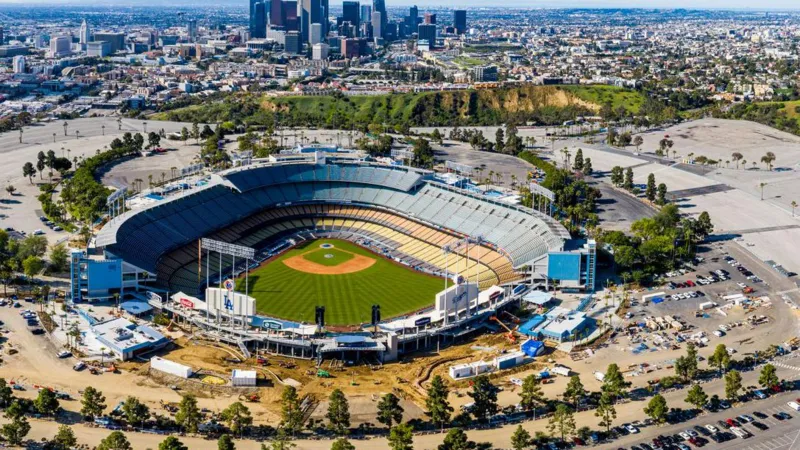The Los Angeles Dodgers have found themselves at the center of a growing national conversation following a revelation that immigration enforcement agents were denied entry to Dodger Stadium. The incident, which has drawn sharp attention from both supporters and critics, occurred earlier this month and has since escalated into a broader debate involving immigration law enforcement, sports venues, public policy, and community trust.
According to a statement from the Dodgers organization, several agents from U.S. Immigration and Customs Enforcement (ICE) attempted to enter Dodger Stadium ahead of a home game but were turned away by stadium security. The agents, reportedly in plain clothes but carrying badges and identification, were seeking access in connection to what they characterized as an “ongoing federal investigation.” However, their presence raised immediate concerns among stadium personnel, who cited policy limitations and community safety considerations in denying their entry.
The Dodgers later confirmed that the agents did not present a judicial warrant, which is typically required for federal law enforcement agencies to access private or semi-private areas not open to the public. A team spokesperson emphasized that the stadium’s policy requires all law enforcement agents—local, state, or federal—to coordinate with the team’s legal and security departments prior to entering restricted areas unless there is an imminent threat to public safety. The absence of a warrant or prior notification triggered an automatic denial of access, in line with internal policy.
This policy, the Dodgers clarified, is rooted in the team’s long-standing commitment to making the stadium a “safe and welcoming environment for all fans,” particularly those from immigrant communities. The organization has a rich history of engagement with Latino, Asian, and immigrant populations across Southern California. Many within the Dodgers’ fanbase come from communities deeply affected by immigration enforcement policies, and the team has consistently taken steps to ensure the stadium is not perceived as a surveillance zone or enforcement trap.
Still, the incident has touched off a firestorm of reactions on both sides of the aisle. Critics argue that the team overstepped by denying federal agents entry and potentially interfered with a legitimate investigation. Conservative lawmakers and pundits have accused the Dodgers of harboring a political agenda that undermines the rule of law. Some have even suggested that Major League Baseball should investigate whether the team’s policy violates federal guidelines or obstructs federal operations.
ICE, for its part, issued a terse response following the media reports. In a written statement, the agency confirmed that its officers attempted to access Dodger Stadium in relation to a federal case but declined to specify the nature of the investigation. The agency expressed “disappointment” at the denial of entry, arguing that such actions hinder effective law enforcement and send the wrong message to bad actors who might believe sports venues are safe havens.
While the agency did not say whether it would take further action against the team or its staff, the implications are far-reaching. Immigration attorneys have been quick to weigh in, noting that while ICE does have wide authority in many cases, it does not have carte blanche to enter private facilities without appropriate legal documentation. They note that Dodger Stadium, despite its public events, remains a privately owned venue with discretion over who is allowed to access restricted areas.
Civil rights groups have praised the Dodgers’ decision, calling it an example of responsible corporate behavior in the face of potentially harmful overreach. “What the Dodgers did was draw a line between sports and state surveillance,” said Maria Sanchez, a spokesperson for the Southern California Immigrant Justice Coalition. “In a time when immigrant communities feel under siege, having a place where families can gather without fear is not just symbolic—it’s essential.”
That sentiment resonates in communities like Boyle Heights and East L.A., where generations of Dodger fans have developed a deep connection to the team. For many, Dodger Stadium is not just a ballpark—it is a cultural sanctuary. Local leaders have long encouraged institutions, including sports teams, to develop policies that prioritize trust, transparency, and safety, especially for undocumented residents who might otherwise avoid public events out of fear.
The timing of the incident adds another layer of complexity. It comes amid a heated national election cycle in which immigration has once again emerged as a defining issue. Politicians from both parties have seized on the story for leverage. Some have accused the Dodgers of playing politics, while others have lauded the team for standing firm in defense of its values and its fanbase.
Team officials have tried to strike a delicate balance, emphasizing that their decision was not about taking sides politically but about adhering to principles and policies developed over years of careful consultation with legal experts, security professionals, and community stakeholders. They reiterated that had the agents provided a valid judicial warrant or posed an immediate threat, they would have been granted access without hesitation.
The broader sports world is watching closely. Other major league teams are reportedly reviewing their own policies regarding law enforcement access in light of the Dodgers’ stance. While many teams already have policies that require warrants for entry into non-public areas, the Dodgers’ high-profile rejection of ICE agents could serve as a catalyst for more formalized guidelines across the league.
Legal scholars note that the issue sits at the intersection of property law, constitutional rights, and federal jurisdiction. While the Supremacy Clause of the U.S. Constitution grants federal law precedence over state law, it does not nullify the Fourth Amendment protections against unlawful search and seizure. In practical terms, that means federal agents, like any other law enforcement body, generally need a warrant to enter spaces not open to the general public—unless there are exigent circumstances.
This legal foundation has become increasingly important in sanctuary cities and spaces where local authorities seek to distance themselves from aggressive federal enforcement tactics. In many of these locales, policies have been enacted to limit cooperation with ICE unless certain legal criteria are met. Sports venues, though typically outside the realm of political controversy, are now being pulled into these debates as flashpoints of cultural and legal confrontation.
Meanwhile, fans at Dodger Stadium continue to flock in droves, largely unaffected on the surface by the controversy. Yet for many, the incident represents a deeper philosophical question about the role of sports organizations in the current sociopolitical climate. Should teams remain neutral observers, or do they have a moral responsibility to take stands on issues that impact their fans’ lives?
For the Dodgers, the answer—at least in this case—was clear. By refusing entry to immigration agents without a warrant, the team reaffirmed its commitment to protecting the integrity of its venue and the dignity of its community. Whether that stance will invite further scrutiny, legal challenges, or emulation from other franchises remains to be seen.
In the meantime, the Dodgers are preparing for a critical stretch of games as they chase another postseason berth. But the shadow of this incident will likely linger well beyond the season. It is now a permanent part of the team’s broader identity—an identity shaped not only by wins and losses but by the values it chooses to uphold in moments of quiet confrontation.
As one fan in Chavez Ravine put it during a recent game, “It’s not just about baseball. It’s about feeling like you belong somewhere. And today, the Dodgers made sure we knew that we do.”



